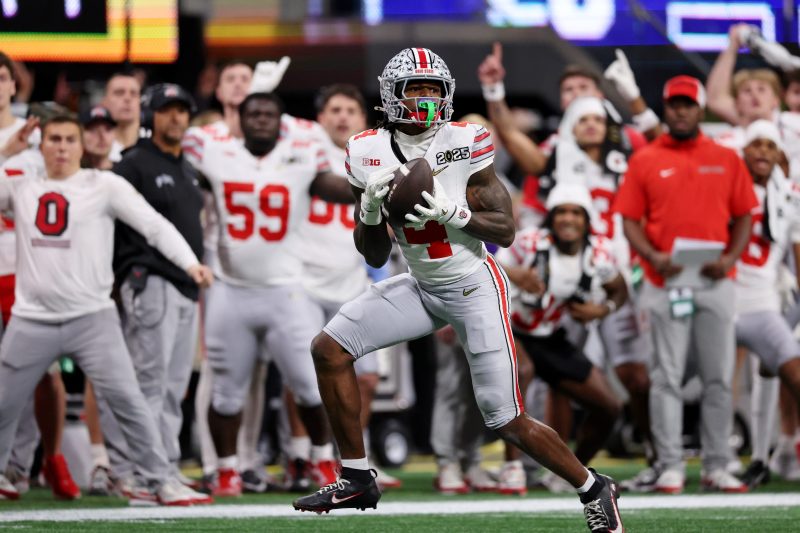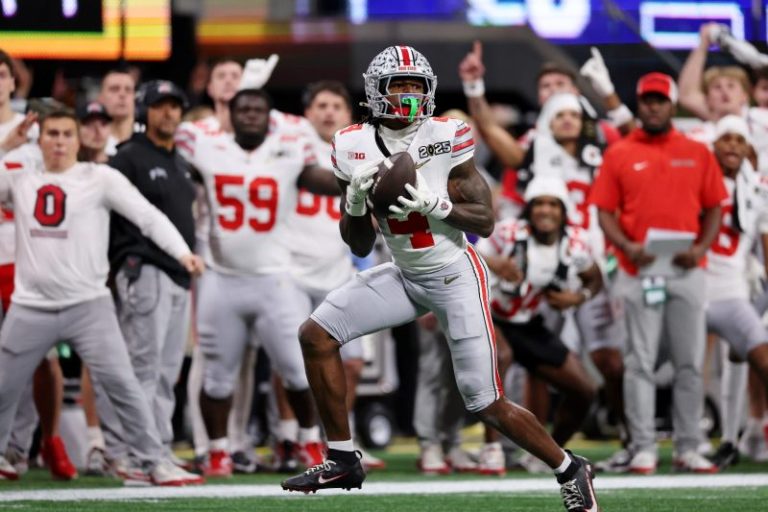
It’s unshakeable and unmistakable, this rare and real lifelong bond of college football championship teams. There is no greater truism.
Yeah, well, money changes everything.
Money is the very reason Ohio State star freshman wide receiver Jeremiah Smith – the best player on the field in Monday’s national championship victory over Notre Dame – should enter the transfer portal and test the open market.
The engraving isn’t set on the national championship trophy, but the writing couldn’t be more on the wall in the now age of get yours. Millions are available in NIL deals, why ignore it?
More to the point: with the NFL still two years away for Smith, why risk a potential career-defining injury without earning as much as you possibly can?
This isn’t about staying true to your school. It’s about financial security in a physically-demanding business, where the end is always one play away.
“I’ve got two, three years left of college,” Smith said. “I’m just focused on college right now.”
And that’s the point. That’s where this uncomfortable but necessary conversation must begin.
Because football, at the college or NFL level, has always been a game of what can you do for me now? And when you can’t do it anymore, for whatever reason, it’s next man up.
If you think college football has moved closer to the NFL in every aspect over the last four years of the NIL boom, it’s obvious what ugly reality comes next. The NFL uses players until they’re not physically able to play at an elite level, and once that happens, they cut players loose.
Thanks for your help, we’re moving on. That’s not college football, you say. It’s not a cold, cutthroat business.
College football is not only a business, it’s more player-friendly than anything the NFL Players Association could dream of demanding. It’s free player movement every single season.
It’s outperforming your contract in one season, and jumping into the portal and finding another team to pay you more. The NFL, for first-round picks in the annual draft, may as well be a career sentence.
The team has players guaranteed for the first five years of their career (if it picks up the option year of the first contract), and has exclusive negotiating rights thereafter. In other words, if players can’t come to an agreement on a deal, the team can use a franchise tag to force a one-year deal ― a tag that can be used as many as three times.
And if players sustain a career-defining injury during that one-year franchise deal, they’re out of luck. Guess who’s moving on?
This is how Smith must see his next two seasons of college football. It would be fiscally reckless to see it any other way.
Former Ohio State star wideout Marvin Harrison Jr. was the first wide receiver selected in last year’s draft, going No.4 overall to the Cardinals. He signed a fully-guaranteed $35.3 million contact.
Smith would not only be the first wide receiver selected in this year’s draft, he would likely be picked in the Top 5. In other words, a near identical deal.
That’s what a transfer portal move means for Smith. No matter what he’s earning from Ohio State now, he has outperformed it.
He can enter the portal and return to Ohio State with a better deal, and we can all still talk about loyalty and lifelong bonds of championship teams. The grand statement can be made that at least one player still values school and money.
But by entering the portal, he can also see what the market will bring — then go back to Ohio State and see if the Buckeyes will match it. And if they don’t or can’t, he moves on with a championship and memories that will still last a lifetime.
Maybe he returns to Miami, where he grew up and won three state titles at Hollywood Chaminade-Madonna. That’s four titles in four seasons, and the best player on the field in each season.
“It just shows that I picked two great schools,” Smith said.
Now it’s time to choose again, to hit the open market and see what it brings. Be it at Ohio State, or somewhere else.
This has nothing to do with chasing money, or a lack of loyalty or leaving teammates behind. It has everything to do with financial future.
Again, it’s fiscally reckless for Smith, or any elite college player on a one-year deal, to not see what else is out there. If college football truly is a mini-NFL, there’s one truism that really is undeniable.
They’ll use you until they can’t, and then move on. The only difference is college players control movement and money.
And money changes everything.
Matt Hayes is the senior national college football writer for USA TODAY Sports Network. Follow him on X at @MattHayesCFB.

